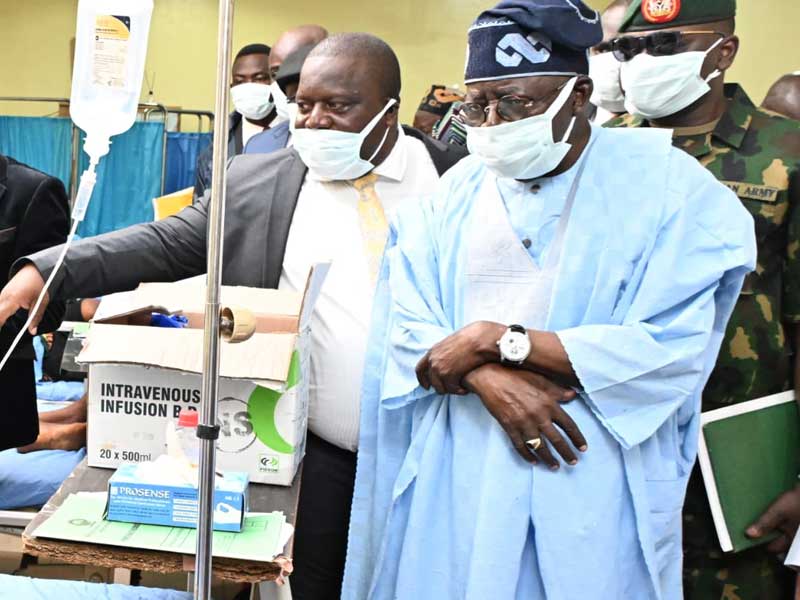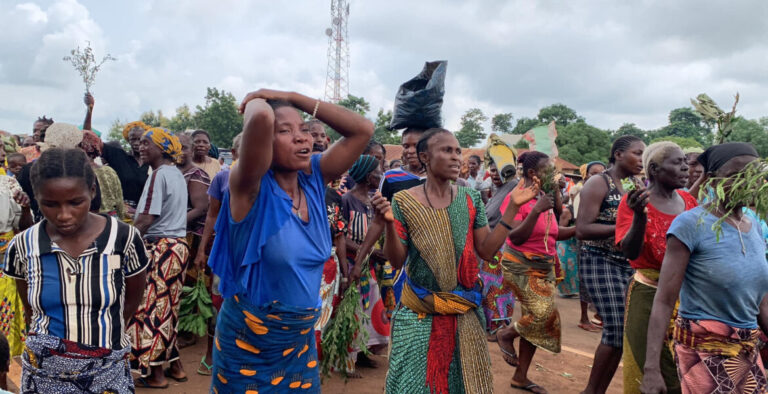It’s been exactly one week since a devastating attack ravaged Yelwata community in Benue State, North-central Nigeria, leaving over 100 people dead, many injured, and thousands displaced.
The attack, which targeted innocent civilians, was among the deadliest in recent months in Nigeria’s long-running conflict between farming communities and herders, which has intensified due to disputes over land, water access, migration routes, and livestock damage.
Multiple sources said the attackers doused roadside stalls and makeshift shelters with petrol before setting them ablaze. It was one attack, too many.
Victims of the attack includes Internally Displaced Persons (IDPs) from communities including Antsa, Kadarko, Dooka, Giza, and Udei, who had sought refuge in Yelewata, believing it to be safer due to the presence of nearby security checkpoints.
It was not just another tragedy; it’s a damning reflection of a system that watches its people die, then moves on. As blood stains another stretch of Benue soil, Nigeria is forced to confront a painful truth that nowhere feels truly safe anymore. The bloodshed continues to add to a long and painful national story.
While the affected community members are still grappling with the aftermath of the attacks, with many families mourning the loss of loved ones, the deadly attack has sent shockwaves throughout the country, sparking widespread outrage and calls for justice.
Following public outrage and calls on authorities to take decisive action to address the security situation in the state and ensure that those responsible for the attacks are brought to justice, President Bola Tinubu on Wednesday, visited Benue State where he gave security operatives the mandate to apprehend the perpetrators and assured that more would be done to restore peace and stability to the region.
Conflicting figures
As of the time of this report, there’s no actual number of the victims killed in the attacks as many are still missing. While locals said that the death toll is over 200, National Emergency Management Agency (NEMA) said the casualty figures remain inconsistent due to the volatile security situation and limited access to affected areas.
Meanwhile, a situation report by NEMA on 16 June revealed that as of the night of 15 June, a total of 1,069 households comprising 6,527 individuals had been displaced in the aftermath of the recent violence in the state. Among those displaced are 657 children under the age of 18, and 1,870 adults aged 18 and above. Notably, there are 252 lactating mothers, 82 pregnant women, and 91 elderly persons.
The attack has also resulted in a humanitarian crisis, with many displaced persons in need of basic necessities like food, shelter, and medical care.
A global human rights organisation, Amnesty International estimates that more than 6,896 people have been killed in such attacks across Benue between 2024 and May 2025.
The International Organisation for Migration (IOM) reported that, as of 2024, Benue State had over 500,000 registered internally displaced persons (IDPs). The figure has continued to increase, placing Benue among the Nigerian states with the highest number of displaced persons.
While some families were completely wiped out in the attack, a few survivors have shared their harrowing experiences, expressing deep pain and anguish.
“We are dying. A lot has happened to us and it does not appear to end anytime soon. We do not have enough security officials at the local areas where some of these attacks often occur. We need help,” a local who identified himself as Godspower Johnstone said.
Tinubu visits Benue
On Wednesday, President Tinubu paid a condolence visit to Benue State alongside Secretary to the Government of the Federation, George Akume, Senate Minority Leader, Abba Moro, other federal lawmakers from Benue State, as well as governors from the North Central zone, Ministers, and other government appointees.

After visiting survivors of the attack in Benue State University Teaching Hospital (BSUTH), Makurdi alongside Governor Hyacinth Alia, he proceeded to the Benue state government house for a stakeholders meeting. At the meeting, the president issued a stern warning to the Service Chiefs and the Inspector General of Police, urging them to ensure that the criminals responsible are brought to justice.
“Police, I hope your officers are alert and ready to act on credible information. We must remain vigilant and ensure we capture these criminals and remove them. Director Generals of the NIA and SSS, please upgrade your intelligence-gathering channels so we can prevent a recurrence of this tragedy.
“We need to get our ears to the ground. Let’s get those criminals. Let’s get them out,” Tinubu told the Chief of Defence Staff, Christopher Musa, during a town hall meeting with political leaders in the affected state.
It was expected that President Tinubu would visit Yelwata but he aborted the trip due to flooding and poor state of the road leading to the community. The development has since sparked outside as many argued that the poor state of the road shows government inactions.
“If the Commander-in-Chief cannot reach a part of his own country due to bad roads, what hope is there for the ordinary Nigerian who plies those same routes every day?” Peter Obi, a former presidential candidate of the Labour Party asked on X.
“Leadership is not about comfort; it is about sacrifice. It is about standing with your people, especially in moments of pain and tragedy. You cannot abandon your citizens in their hour of need. You don’t offer excuses when action is required,” he added.
What next after Tinubu’s visit?
While President Tinubu’s directive to security agencies to intensify efforts to apprehend the perpetrators of the massacre, the lack of arrests many days after the attack raises concerns about the effectiveness of security operations.
The peace committee, tasked with finding a lasting solution to the crisis, includes former governors, traditional rulers, and federal officials needs the proactiveness of security officials to engage with local stakeholders and address the root causes of the conflict.
![Benue youth protest[CreditX.com]](https://devreporting.com/wp-content/uploads/2025/06/IMG_1892-1200x705-1.jpeg)
Way forward
Speaking with DevReporting, a retired Air Commodore Yusuf Anas offered a multi-dimensional perspective on the security crisis in Benue State, drawing from his personal experience of living in the state for over three years.
He explained that the conflict in Benue can be understood from three major angles. First is the age-long herder/farmer clashes, which he described as a recurring issue, especially during harvest seasons.
The second dimension, according to Mr Anas who is the Executive Secretary of the Centre for Crisis Communication (CCC) is the lingering inter-communal clashes between the Tiv and Jukun ethnic groups, which often centre on land ownership, farming territories, and unclear boundaries.
Thirdly, he pointed to the growing criminality, which he said has taken root over time and now operates independently of the two earlier groups.
“These criminal gangs kill, maim, and loot food items and other valuables. They are not part of the herder/farmer clashes or communal disputes. They emerged about a decade ago and have since been empowered by desperate politicians who use them to attack opponents and fuel insecurity.”
According to Mr Anas, each of these security challenges requires a distinct approach. He emphasised that the herder/farmer conflict, in particular, needs to be addressed at multiple levels including village, local government, and state because of its persistent nature across different communities in the state.
“Note that the previous government enacted a law prohibiting open grazing in the state. Some herders were even levied, which led to friction between them and the government,” he added.
It would be recalled that the former governor of Benue state, Samuel Ortom’s administration in 2017 introduced the Open Grazing Prohibition and Ranches Establishment Law.
The law, passed by the state assembly banned open grazing and encouraged ranching as a modern method of livestock rearing. It also included punishments for cattle rustlers and anyone violating the anti-open grazing law. The idea was to stop animals from moving freely and destroying people’s farms.
Mr Anas stressed the need to re-evaluate existing policies and explore more inclusive solutions that bring all parties to the table to resolve or mininise occurrence of such incidents. “As long as grazing exists, there will always be tension over farmland.”
Responding to the issue of lingering inter-communal clashes, Mr Anas noted that conflict is a natural part of any society, but how it is managed makes all the difference.
“The various communities must agree and accept that they are all Nigerians and must live in peace and harmony together.”
He also called for direct and decisive government action against criminal gangs, noting that their activities constitute outright criminality and should not be tolerated under any guise.
“Government must flush out these criminals from communities where they are hiding. Security agencies must arrest and prosecute them to serve as a deterrent. They cannot be allowed to lie low in different parts of the state and be used for political ends,” he added.
Meanwhile, Governor Alia, has appealed to the Federal Government to establish state police and set up an intervention fund. According to him, creating state police may come with challenges, but it would go a long way in curbing the wave of violence in the state.


